EVERYTHING YOU WANT TO KNOW ABOUT ULCERATIVE COLITIS, SYMPTOMS, DIAGNOSIS, TREATMENTS
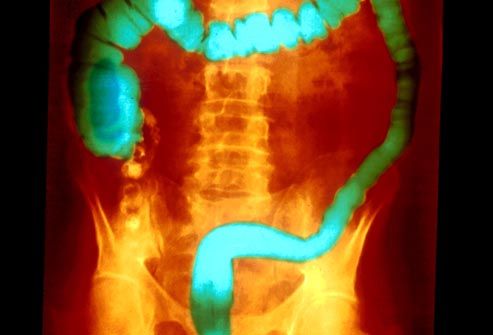
What is Ulcerative Colitis?
Ulcerative colitis is a form of inflammatory bowel disease. It causes chronic inflammation of the cells that line the rectum and colon (large intestine). This inflammation can lead to sores called ulcers, which may bleed and interfere with digestion. There are medications to calm the inflammation, as well as strategies to lessen the effect ulcerative colitis has on daily life.
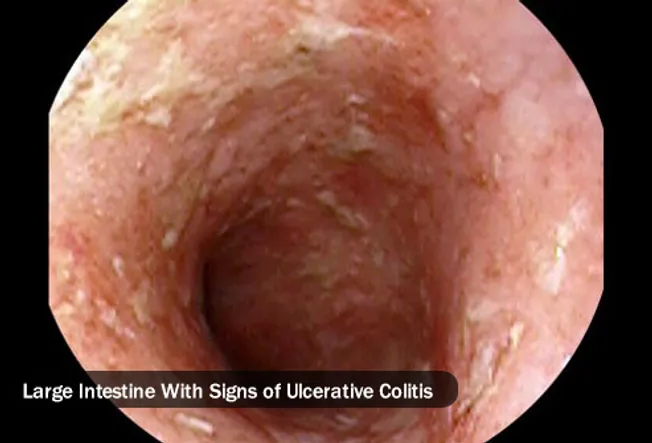
Abdominal Pain
Abdominal pain and bloody diarrhoea are the most common warning signs of ulcerative colitis. These symptoms range from infrequent and mild to persistent and severe. Seen here is a section of the large intestine with changes typical of ulcerative colitis.
Weight Loss
Chronic inflammation in the colon can cause digestive problems that may result in:
Weight loss
Poor appetite
Nausea
Poor growth in children
Other Warning Signs
Some people with ulcerative colitis have symptoms outside the digestive system. These may include:
Joint pain
Skin sores
Fatigue
Anaemia
Frequent fevers
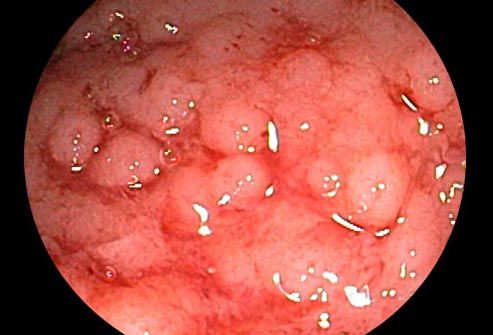
Ulcerative Colitis or Crohn's?
The symptoms of ulcerative colitis are similar to another form of inflammatory bowel disease called Crohn's. The difference is that UC occurs only in the large intestine, while Crohn's can occur in various places throughout the digestive tract, so symptoms may occur anywhere from the small intestine to the mouth. Irritable bowel syndrome is another disorder known for chronic belly pain and diarrhoea, but it does not cause inflammation or sores in the intestines.
Who Gets Ulcerative Colitis?
Ulcerative colitis mainly affects people in developed nations, and it's more common in urban areas than in the countryside. In the U.S., about 700,000 people have the disease. Although it can occur at any age, it usually develops between the ages of 15 and 25. Ulcerative colitis tends to run in families and is more common in whites. People of Eastern European Jewish descent have a higher risk than most.
What Causes Ulcerative Colitis?
The exact cause of ulcerative colitis is unclear, but researchers suspect the immune system is involved. In people with UC, immune cells may react abnormally to bacteria in the digestive tract. It is not known whether this triggers the condition or is a result of it. Doctors are confident that the disease is not caused by stress or diet, although these factors can make the symptoms worse.
Diagnosing Ulcerative Colitis
The most accurate way to test for ulcerative colitis is by colonoscopy. In this procedure, a tiny camera is inserted into the rectum to provide an up-close look at the inside of the colon. This will reveal any inflammation or ulcers in the area. A colonoscopy can also help your doctor rule out Crohn’s disease, diverticulitis, and cancer.
The Course of Ulcerative Colitis
Ulcerative colitis symptoms may come and go. During remission, you may have no discomfort at all. This period can last for months or years, but the symptoms eventually return. Not knowing when symptoms will flare can add to the stress of the disease and make it difficult to come up with an effective treatment plan.
Urgent Care for Ulcerative Colitis
Ulcerative colitis sometimes causes complications that require hospitalization. These may include an ulcer that is bleeding profusely or severe diarrhoea that causes dehydration. In these cases, your medical team will work to stop the loss of blood and fluids. If there is a tear in the colon, it may need to be surgically repaired.
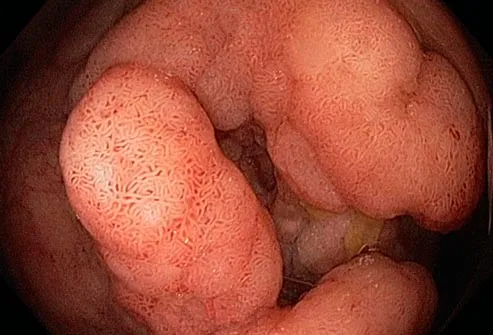
Ulcerative Colitis and Colon Cancer
About 5% of people with ulcerative colitis develop colon cancer. The cancer risk increases the longer you have the disease and the more damaged the colon becomes. If you have had UC for at least eight years, your doctor may recommend an annual colonoscopy to look for precancerous cells. These screenings won't prevent cancer, but they greatly improve the odds of detecting it early when it is most treatable.
Other Complications
Some people with ulcerative colitis develop serious problems outside the colon. These may include osteoporosis, arthritis, kidney stones, and, in rare cases, liver disease. Researchers believe the complications result from widespread inflammation triggered by the immune system. These problems may improve when ulcerative colitis is treated with anti-inflammatory medications.
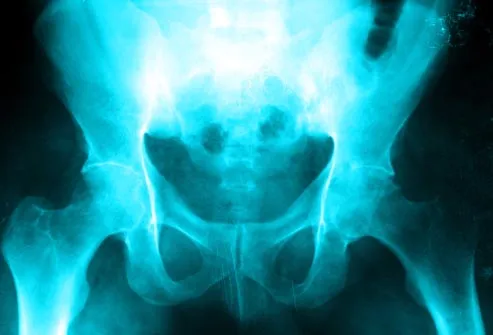
Medications for Ulcerative Colitis
Medications for ulcerative colitis aim to calm the inflammation inside the colon. The first choice is usually a drug that contains aminosalicylates. If that fails to provide enough improvement, your doctor may prescribe a steroid, such as prednisone. A third option is immune modifiers, which reduce inflammation by altering immune activity. It can take up to three months before the benefits are felt.
Biologic Therapies
Biologic therapies are the newest type of treatment for people with ulcerative colitis. This therapy helps the body destroy an inflammation-inducing protein called tumour necrosis factor (TNF). Also known as anti-TNF agents, they are usually given intravenously. Biologic therapies are recommended for patients who do not improve on standard medications.
Whip-worm Therapy
Recent studies suggest pig whip-worm may be helpful in fighting ulcerative colitis. The idea stems from the fact that the disease is rare in developing countries, where intestinal parasites are far more common. Researchers think the worms may alter the immune response in the intestines. In a small study in the journal Gastroenterology, 43% of patients improved after ingesting pig whip-worm eggs for 12 weeks.
Surgery for Ulcerative Colitis
Despite advances in medication, 25%-40% of people with ulcerative colitis eventually need surgery -- either to repair a tear or to remove a severely damaged colon. Ulcerative colitis does not recur after removal of the colon, so this surgery can offer a cure. Better techniques mean that people who have their colon removed usually do not need an external pouch to collect waste, called a colostomy bag.
Ulcerative Colitis in Children
Children with ulcerative colitis often have a poor appetite. They may take in too few calories or have trouble absorbing nutrients from the foods they do eat. To avoid growth problems, your doctor may recommend a high-calorie diet. Children may also feel embarrassed about urgent trips to the bathroom. Working with a therapist who specializes in chronic illnesses can help your child learn coping strategies.
Living With UC -
1)Reducing Flares
A variety of factors can make the symptoms of ulcerative colitis worse. Common triggers include stress, smoking, missing doses of medication, and eating certain foods. Try to identify your personal triggers and take steps to avoid them, such as practising meditation to manage stress or using a daily pillbox to remember every dose. If flares continue, talk to your doctor about a change in medication.
2) Diet Changes
Diet does not cause ulcerative colitis, but some foods may make the symptoms worse. Common culprits include dairy, fatty foods, and too much fibre (which can trigger diarrhoea). It may be helpful to keep a journal of what you eat and any symptoms you have. Look for links and try avoiding suspected triggers. If severe weight loss becomes an issue, you may need to work with a dietician to develop a high-calorie diet.
3) Supplements
Because ulcerative colitis often causes bleeding in the colon, it can lead to anaemia and iron deficiency. Some of the medications used to treat ulcerative colitis can interfere with the absorption of nutrients such as folic acid and calcium. Ask your doctor whether you should take supplements to treat these deficiencies.
4) Probiotics
Typically, probiotics are "friendly" bacteria that are similar to those that live in the intestines and help prevent the overgrowth of harmful bacteria. An analysis of 13 studies found that probiotics may help people with ulcerative colitis maintain remission. More studies are under way. Probiotics are added to some yoghurt, milk, tempeh, and soy beverages, and are also available as supplements.

5) Staying Hydrated
Chronic diarrhoea creates a high risk of dehydration, which can lead to weakness and kidney problems. To stay hydrated, drink plenty of water -- for every pound you weigh, drink half an ounce per day.
6) Relationships
The symptoms of ulcerative colitis can make some patients wary of intimacy. There's embarrassment over frequent trips to the restroom, along with abdominal pain, fatigue, and other mood killers. Steroids can also interfere with libido and body image. Be open with your partner about your concerns, and consider seeing a therapist who specializes in chronic illness. If sexual dysfunction becomes an issue, talk to your doctor.
Labels: abdominal pain, anaemia, Colon, colonoscopy, colostomy, diarrhoea, fibre, hydrated, immune system, Kidney Stones, kidneys, Osteoarthritis, probiotics, surgery, therapies, ulcerative colitis, whip-worm

0 Comments:
Post a Comment
<< Home